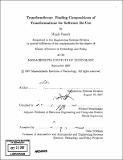| dc.contributor.advisor | Michael Stonebraker. | en_US |
| dc.contributor.author | Pamuk, Mujde | en_US |
| dc.contributor.other | Massachusetts Institute of Technology. Technology and Policy Program. | en_US |
| dc.date.accessioned | 2008-05-19T16:16:05Z | |
| dc.date.available | 2008-05-19T16:16:05Z | |
| dc.date.copyright | 2007 | en_US |
| dc.date.issued | 2007 | en_US |
| dc.identifier.uri | http://hdl.handle.net/1721.1/41768 | |
| dc.description | Thesis (S.M.)--Massachusetts Institute of Technology, Engineering Systems Division, Technology and Policy Program, 2007. | en_US |
| dc.description | Includes bibliographical references (leaves 77-83). | en_US |
| dc.description.abstract | As organizations collect and store more information, data integration is becoming increasingly problematic. For example, nearly 70% of respondents to a recent global survey of IT workers and business users called data integration a high inhibitor of new application implementation. A number of frameworks and tools have been developed to enable data integration tasks. The most prominent include schema matching, use of ontologies and logic-based techniques. A joint project by UFL and MIT, Morpheus, has attacked the same problem with a unique emphasis on re-use and sharing. In the first part of the thesis, we try to define software re-use and sharing in the context of data integration and contrast this approach with existing integration techniques. We synthesize previous work in the field with our experience demoing Morpheus to an audience of research labs and companies. At the heart of a system with re-usable components is browsing and searching capabilities. The second part of this thesis describes TransformScout, a transform composition search engine that automates composition of re-usable components. Similarity and quality metrics have been formulated for recommending the users with a ranked collection of composite transforms. In addition, the system learns from user feedback to improve the quality of the query results. We conducted a user study to both evaluate Morpheus as a system and to assess TransformScout's performance in helping completing programming tasks. Results indicate that software re-use with Morpheus and TransformScout has helped the user perform the programming tasks faster. Moreover, TransformScout was useful in aiding the users with completing the tasks more reliably. | en_US |
| dc.description.statementofresponsibility | by Mujde Pamuk. | en_US |
| dc.format.extent | 83 leaves | en_US |
| dc.language.iso | eng | en_US |
| dc.publisher | Massachusetts Institute of Technology | en_US |
| dc.rights | M.I.T. theses are protected by
copyright. They may be viewed from this source for any purpose, but
reproduction or distribution in any format is prohibited without written
permission. See provided URL for inquiries about permission. | en_US |
| dc.rights.uri | http://dspace.mit.edu/handle/1721.1/7582 | en_US |
| dc.subject | Technology and Policy Program. | en_US |
| dc.title | TransformScout : finding compositions of transformations for software re-use | en_US |
| dc.title.alternative | Finding compositions of transformations for software re-use | en_US |
| dc.type | Thesis | en_US |
| dc.description.degree | S.M. | en_US |
| dc.contributor.department | Massachusetts Institute of Technology. Engineering Systems Division | |
| dc.contributor.department | Technology and Policy Program | |
| dc.identifier.oclc | 226294484 | en_US |
